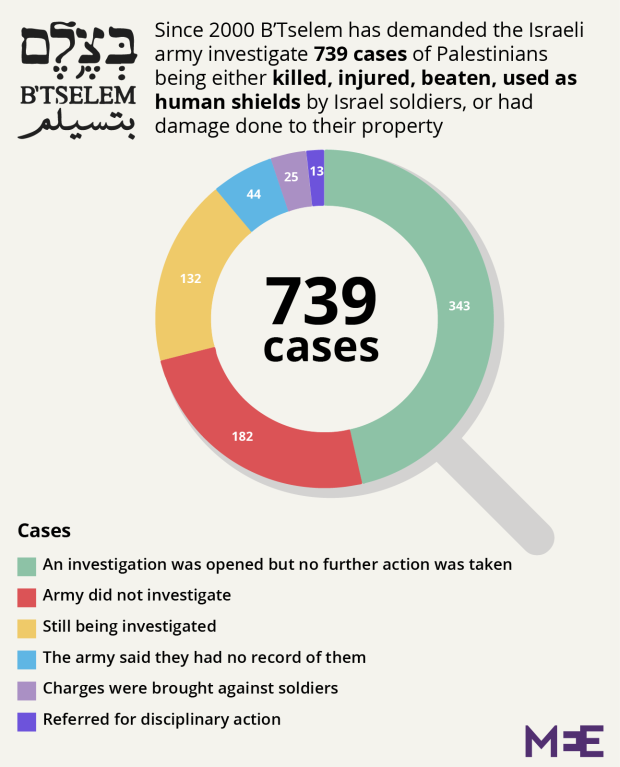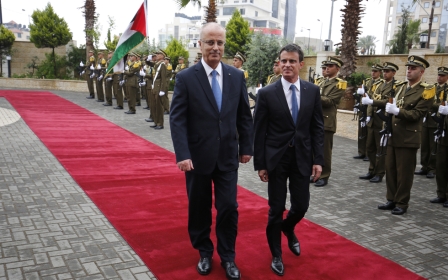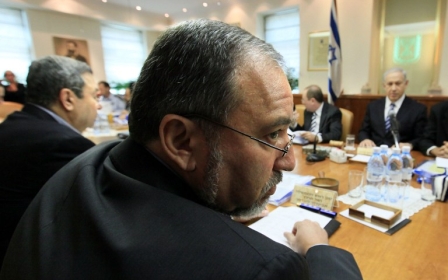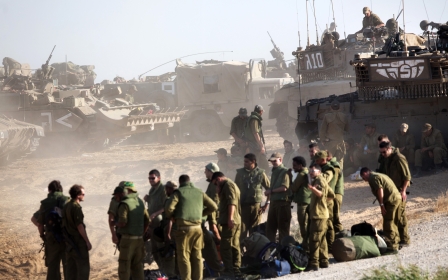Israeli rights group ends army cooperation over 'cover up' of Palestinian abuses
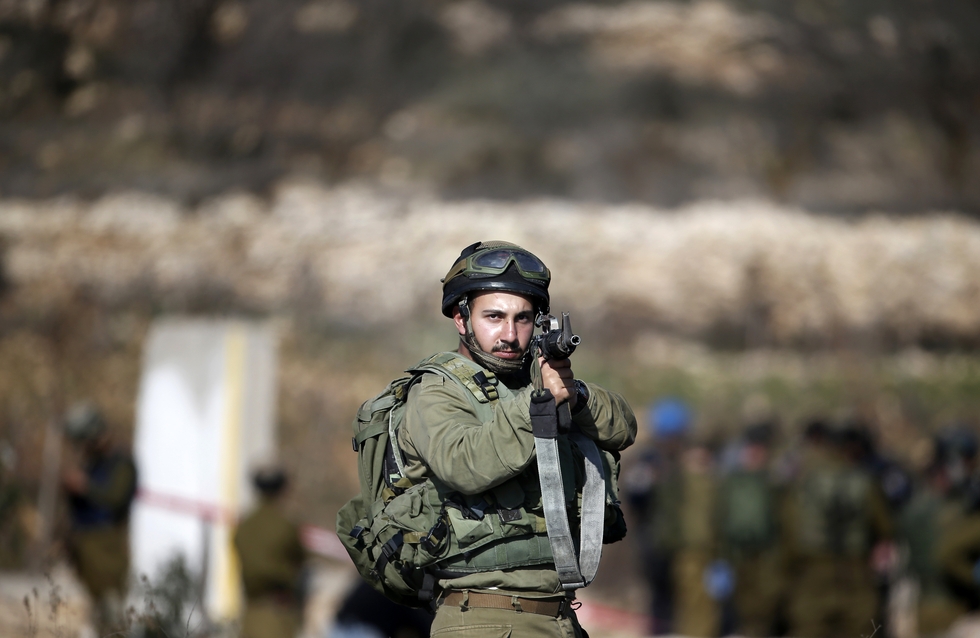
JERUSALEM - One of Israel’s leading human rights organisations announced on Wednesday that after more than 25 years of work, they will no longer submit complaints to the Israeli army regarding the alleged mistreatment of Palestinians.
B’Tselem, which was established in 1989, said in a statement that “there is no longer any point in pursuing justice and defending human rights by working with a system whose real function is measured by its ability to continue to successfully cover up unlawful acts and protect perpetrators".
The Jerusalem-based rights group said that it would continue to document and report alleged Israeli human rights violations in the occupied Palestinian territories.
But it will “stop submitting complaints, coordinating meetings between [military] investigators and Palestinian victims and eyewitnesses, and securing various documents for the investigating authorities".
B’Tselem has historically collected evidence of abuses by Israel’s army in the occupied Palestinian territories and submitted it for the country’s military law enforcement system to investigate.
Israeli and Palestinian members of B'Tselem staff announced the decision at a press conference in Jerusalem. They said it had been a "difficult decision" but one that had the "full agreement" of Palestinians who were alleged victims of abuse by Israel's army.
'Sweeping immunity'
In a new report released in conjunction with their statement, the group detailed that since 2000, they have demanded that the army investigate 739 cases where Palestinians have either been killed, injured, beaten, used as human shields by Israeli soldiers, or had damage done to their property in the occupied West Bank.
In 182 of these cases - or nearly 25 percent - the military failed to launch an investigation, and in nearly half of them, an investigation was opened but then closed with no further action, the report finds.
In just three percent of cases, charges were brought against soldiers accused of mistreating Palestinians.
B’Tselem said that many of the cases were closed without further action because the military “simply assumed” soldiers’ accounts of an incident were reliable. The rights group also accused investigators of making “no effort” to collect any external or supporting evidence.
In cases involving the death of a Palestinian, B’Tselem said the military often closed investigations on the grounds that the incident had taken place in a “combat situation” – which the rights group claimed granted “sweeping immunity to soldiers from criminal investigations, far above and beyond that granted by international humanitarian law".
“This is the system [of accountability] that officials bring as proof – to Israel and the world – of their claim that the military does everything in its power to investigate complaints against soldiers responsible for harming Palestinians and to prosecute the offenders,” B’Tselem said in a statement.
The system's failings, the group said, are “well known” to senior officials inside and outside the army.
Burden of proof
B’Tselem said that in its experience, Israeli investigators did not believe statements made by Palestinians and instead demanded Palestinians “prove they … are not to blame for the violence they were subjected to".
Their report said that Palestinians “cannot file complaints … directly and must rely on human rights organisations or attorneys to file the complaints on their behalf”.
When investigations have taken place, the group said they have often lasted years and ended with soldiers having completed active service, which means they are no longer subject to military law.
B’Tselem defended its earlier work, explaining that they believed it had been the best way of advancing justice for Palestinians living under Israeli occupation.
“We hoped that in this way we were helping bring justice to the Palestinian victims and to establish deterrence,” the group said.
“In reality, however, B’Tselem’s cooperation with the military investigation and enforcement system has not achieved justice, and has instead lent legitimacy to the occupation regime and aided to whitewash it.”
The group said that even if the current system was operating properly, it focuses exclusively on low-ranking soldiers, absolving senior military and government officials who give the orders.
Eight case studies were featured in the B’Tselem report, including the case of 21-year-old Lubna al-Hanash, who was shot in the head and killed by an Israeli soldier on 23 January, 2013 while walking with a friend near the West Bank’s Arrub refugee camp.
The report says that an Israeli soldier, Corporal Ram, shot Hanash while she was walking towards a university entrance, nearby to where some Palestinians had been throwing petrol bombs and stones at a group of Israeli soldiers.
Despite 10 statements made by seven Palestinian witnesses, and glaring contradictions between accounts given by several soldiers, the military closed the investigation into Hanash's death without any follow up, concluding that the use of lethal fire had been lawful because of the petrol bombs and stones thrown by other Palestinians.
Another case study in the report was Sharif Abu Hayah, a 66-year-old shepherd from the town of Khirbet Abu Falah, near the West Bank town of Ramallah, who was allegedly beaten by a group of six soldiers on 28 January, 2009.
B’Tselem reported that Hayah had unwittingly walked near a group of soldiers covertly observing an area where shootings had taken place, and that he was attacked by the soldiers while tending to his flock.
Hayah said that the soldiers mocked him while taking turns to punch and kick him in an attack that left the elderly Palestinian man with a fractured right arm, as well as bruises and swollen hands.
The attack had only ended when nearby Palestinians heard what was happening and ran to the scene, shouting for the soldiers to release Hayah, who was then blindfolded and only freed two and a half hours later when a senior officer arrived to attend the incident.
The military investigated, and after three years, they closed the case due to a “lack of sufficient evidence," said B'Tselem.
The military had interviewed 12 soldiers – seven of who said they were asleep when the incident had begun – and all of them provided identical accounts in which they said Hayah had caused his own injuries by resisting arrest.
The military investigators allegedly did not contact the International Committee of the Red Cross (ICRC), despite the organisation making a complaint about the incident in which they said one of their paramedics had attended the scene and witnessed evidence of Hayah being beaten by the soldiers.
The group also said that the investigation was closed, and the soldiers’ explanations was accepted, before medical documents could be sent to the authorities.
Responding to B'Tselem's report, an Israeli army spokesperson told MEE that the country's “military justice system is an independent and professional entity".
“The IDF (Israeli army) examines any and all information regarding any sort of misconduct of an IDF soldier,” the spokesperson said via email.
“When it is required, a military police investigation is opened. When findings of the investigation are suspicious, charges are pressed.
“The IDF is unaware of any decision of the kind mentioned made by B’Tselem. In any case, the IDF will continue and act as required to enforce the law and maintain the norms amongst IDF troops.”
Greater polarisation
As for the future of B’Tselem, spokesperson Sarit Michaeli said that the organisation will soon be launching a “public awareness campaign in Israel through local, international, and social media,” which will aim to highlight alleged abuses by soldiers against Palestinians.
At a press conference in Jerusalem, Michaeli conceded that Israeli society is “more polarised probably than it ever has been before” when it comes to the actions of its army in the Palestinian territories, adding that “not all Israelis agree with us – far from it".
But she said the group is confident in its ability to impact public discourse and contribute effectively to the debate around the army’s conduct in the run up to the 50th anniversary of the occupation in 2017.
Michaeli said the group’s project of distributing some 200 cameras to Palestinians in the West Bank had proven successful, and she cited as an example recent footage from Hebron that led to charges against a soldier shown shooting dead an injured Palestinian man.
“We can bring images of the reality on the ground in the occupied territories to the homes of Israelis,” she said.
“We are not going anywhere. We are still here. We are still going to document and publish human rights violations as we always will.”
New MEE newsletter: Jerusalem Dispatch
Sign up to get the latest insights and analysis on Israel-Palestine, alongside Turkey Unpacked and other MEE newsletters
Middle East Eye delivers independent and unrivalled coverage and analysis of the Middle East, North Africa and beyond. To learn more about republishing this content and the associated fees, please fill out this form. More about MEE can be found here.


